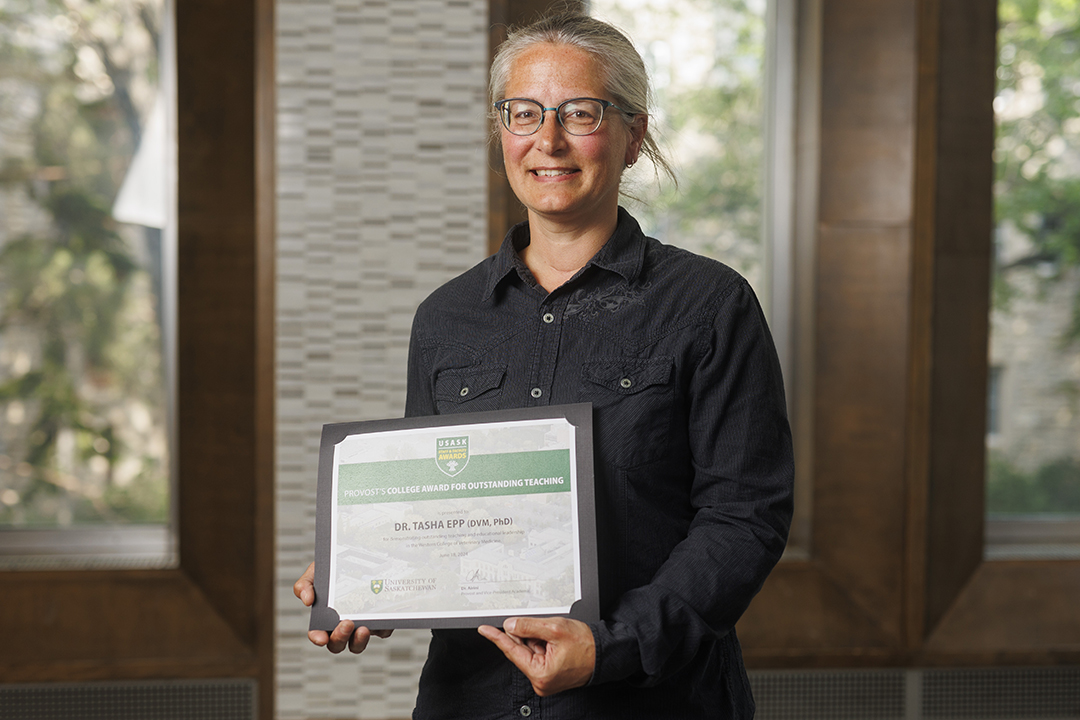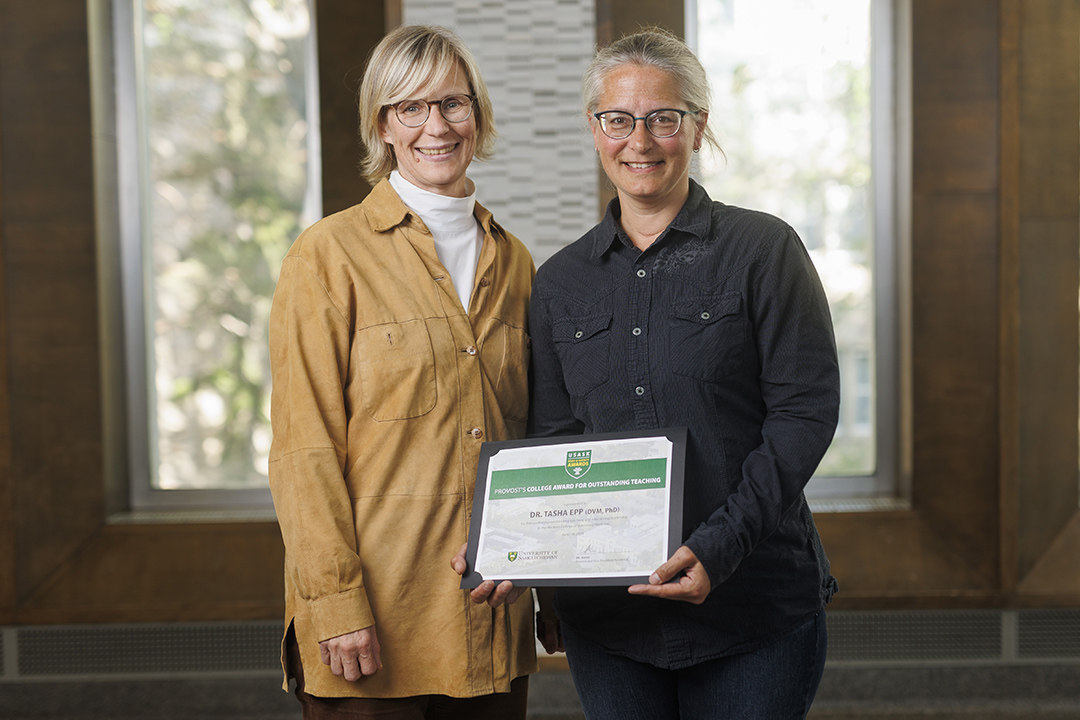
Award-winning professor enjoys helping students achieve ‘aha moments’ in learning
For Dr. Tasha Epp (DVM, PhD), the rewards of teaching all aspects of epidemiology and zoonotic disease to undergraduate veterinary students and graduate students at the University of Saskatchewan (USask) are twofold.
By Tyler SchroederFor Dr. Tasha Epp (DVM, PhD), the rewards of teaching all aspects of epidemiology and zoonotic disease to undergraduate veterinary students and graduate students at the University of Saskatchewan (USask) are twofold.
“It’s really nice to see the progression in a student’s learning as they gain new knowledge and confidence,” says Epp, a professor of zoonotic disease at the Western College of Veterinary Medicine (WCVM). “But I like that I get to learn as much from them as they learn from me.”
Epp’s dedication to enriching her students’ learning experience has led to her latest achievement: she is the WCVM’s 2024 recipient of the Provost’s College Award for Outstanding Teaching. The college teaching awards, which are supported by USask Provost and Vice-President Academic Dr. Airini, annually highlights outstanding teachers at each college on the university’s campus. Epp received the award during the USask Staff and Faculty Awards ceremony on June 18.
“It’s a feeling of disbelief,” says Epp in describing her reaction to receiving the prominent award. “More than anything, I’m proud that students are receptive to my teaching.”
Born in Winnipeg, Man. and raised in Saskatoon, Sask., Epp graduated from the WCVM’s Doctor of Veterinary Medicine (DVM) program in 2000 and spent a few years practising veterinary medicine in Alberta. She returned to her alma mater in 2003 to become a graduate student, pursuing epidemiology-based research on West Nile virus in Saskatchewan horses.
After finishing her PhD in 2007, Epp became a faculty member at the WCVM where she has established herself as a leader and expert in the fields of epidemiology, zoonotic disease and public health. Since 2008, Epp has also been a joint appointee at the USask School of Public Health. At both institutions, she has spent the last 17 years teaching undergraduate and graduate courses on a variety of topics ranging from ecosystem health and public health to zoonotic disease and infection control.
“Teaching wasn’t necessarily something I thought about doing, but it comes with the territory of being an expert in your discipline,” says Epp.
Her expertise also stems from her very active and diverse research program. She and her students and collaborators have addressed important issues such as the significance of dogs in Indigenous culture, managing dog populations and their impact on animal and human health, veterinary access in underserved communities, and companion animal surveillance.
Epp has also played a key role in developing the USask Centre for Applied Epidemiology. The centre, for which she serves as director, is a resource hub for students and professionals involved in public health, human health and animal health. In addition, Epp worked to establish the Master of Science program in field epidemiology — one of only a handful of similar programs offered around the globe. The program provides veterinarians with opportunities to build their skills and knowledge of epidemiological tools in practice.

Epp enjoys the challenge of identifying real-world One Health issues linked through human, animal and environment health and addressing them through applicable education: “I use many real-life examples in our class cases, like teaching students how to do disease outbreak investigations. These are the things that prepare students for the future.”
Epp recognizes that each student learns concepts and material in different ways and strives to meet their needs using multiple formats. Part of her teaching approach is based on her own experience as a student attending courses taught by Drs. Ted Leighton and Gary Wobeser, two longtime WCVM faculty members (now professors emeriti).
Both men taught wildlife pathology at the veterinary college, but they each took very different approaches to teaching students that were equally effective for Epp.
“Those two wildlife pathologists at WCVM were instrumental for me as a student,” says Epp. “Dr. Leighton spent a lot of time with us as graduate students in an informal learning environment with a focus on hands-on learning. Dr. Wobeser mainly used a discussion-based learning format that I liked as well.”
Epp uses both teaching styles depending on class sizes and content type.
“Because I teach both undergraduate and graduate veterinary students, there are different ways I like to teach. Larger classes tend to be more lecture-oriented, whereas smaller classes are usually more discussion-based,” says Epp. “When I give students research topics and readings, I like to use discussions and also build on those using applied and hands-on learning.”
Epp says that keeping students engaged through collaboration is an important part of the learning process, where she can monitor the progress of her students over time and learn from their insights and feedback.
“Seeing the progress of the students from the beginning to the end is really rewarding. They might start at a point where they’re struggling and then begin to make sense of a concept through repetition,” says Epp. “Those ‘aha moments’ are really nice to see.”
Epp says that expanding her own knowledge in the classroom through learning gives strong motivation for her career that she hopes will also inspire her students in their own future roles.
“Every time they feel like they’ve learned something new, it gives them a little bit of a push to learn more,” says Epp. “With that comes more self confidence in their abilities.”
